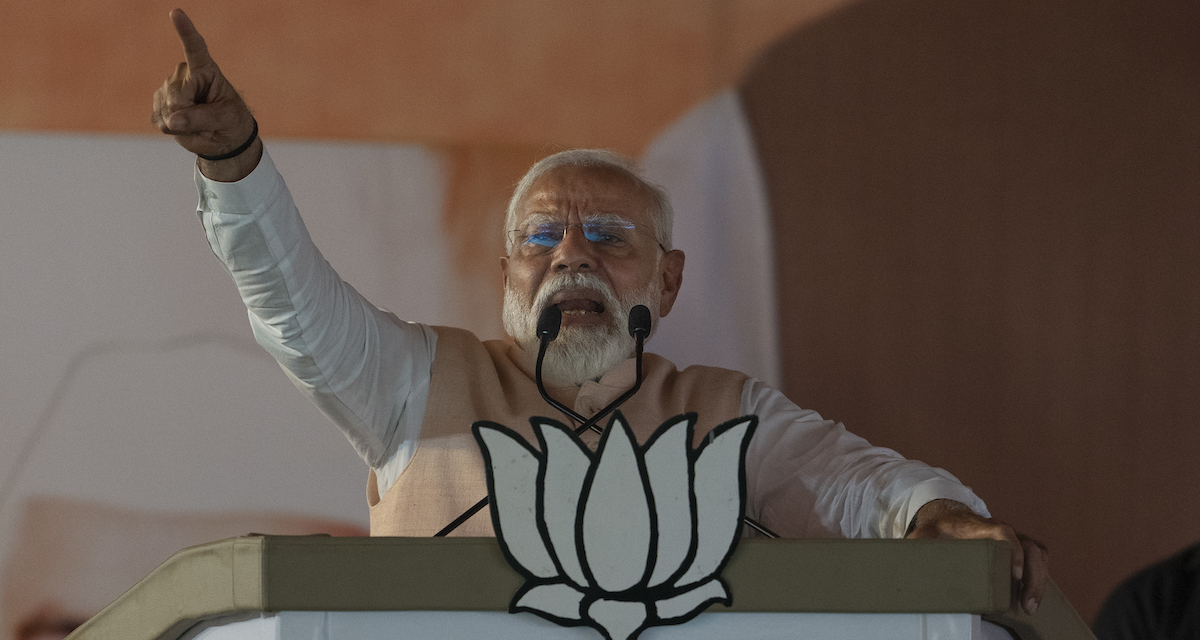Loading player
For some time, Indian Prime Minister Narendra Modi has used very different tones when he addresses his potential voters in India, and in particular the Hindu majority to which he belongs, and when he speaks to an international audience, mainly to the leaders of other countries facing to whom he doesn’t want to seem too radical. This difference in rhetoric, which is an important part of Modi’s way of governing, has become even more evident during the elections currently underway in the country, which are in fact accompanied by a continuous electoral campaign: the vote in fact began on April 19 and will end on June 1st.
Internally, Modi has never made a secret of his intention to transform India into a Hindu country, where in particular the Muslim minority, which constitutes 14 percent of India’s population and numbers around 200 million people, has few rights and it is discriminated against. Just a few days ago, during a rally in the western state of Rajasthan, Modi He attacked the main opposition party, the Congress Party (centre-left), making false statements regarding relations between Hindus and Muslims: it claimed that if the Congress Party were to win the elections it would confiscate the assets of Hindus and give them to Muslims.
Furthermore, for some time Modi has also referred to some conspiracy theories widespread in India, such as that of “ethnic substitution” (Muslims have more children because they want to replace Hindus) and that of internal traitors (Indian Muslims are “infiltrators” who do not belong to the nation). On another occasion Modi returned to this theme, addressing Hindu women, “mothers and sisters”, and warning them that the Congress Party would confiscate their jewels and give them to Muslims.
Indian Prime Minister Narendra Modi (AP Photo)
Congress politicians, in addition to denying Modi’s accusations, said the prime minister had delivered “hate speeches” aimed at radicalizing his Hindu electorate. Indeed, the Bharatiya Janata Party (BJP, Modi’s party) is carrying out a very intense and aggressive electoral campaign, in which it tries to present itself as the single party of the Hindu majority, which constitutes around 80 percent of the population.
In the elections currently underway Modi has the advantage, and barring huge surprises, victory is practically assured. But as he himself said in February, his main electoral objective is to expand the current majority in parliament: from the current 303 seats (out of 543 total, therefore already an absolute majority) to 370, a number considered symbolic because it is the article of Constitution that Modi had repealed to strip autonomy from the Muslim-majority region of Kashmir in 2019.
Three hundred and seventy would give Modi the ability to amend the Indian Constitution without needing to ask for help from other parties; furthermore, having an even more overwhelming majority than the current one would contribute to his personal prestige and consolidate the BJP’s dominance over the country: also for this reason, the prime minister’s rhetoric has become more aggressive.
– Read also: Because elections in India last 44 days
As mentioned, at the same time Modi’s speeches change depending on the audience he is addressing, becoming more or less aggressive or reassuring. This rhetorical mix has been noted for example byEconomistwhich in recent days has analyzed all episodes of “Mann Ki Baat”, a radio show that Modi has hosted in person once a month since 2014, the year he became prime minister.
“Mann Ki Baat” more or less means “thoughts from the heart”, and is a broadcast in which Modi wants to give a reassuring and paternal image, with popular tales, uplifting anecdotes and a unified narrative. In some episodes, Modi celebrates India’s religious diversity: in 2018, for example, he said that we must «remember the teachings of the prophet Muhammad and his message. It is our responsibility to follow the path of equality and brotherhood that he taught us with his life.”
This ambiguity has often allowed Modi to present himself as a reliable ally in many international contexts where India, one of the largest and most important countries in the world, is constantly courted by Western governments. Recently, for example, British Prime Minister Rishi Sunak defended Modi from the accusations of discrimination that had been leveled against him during a session of parliament. US President Joe Biden also welcomed Modi with full honors last year, ignoring accusations of human rights violations.
